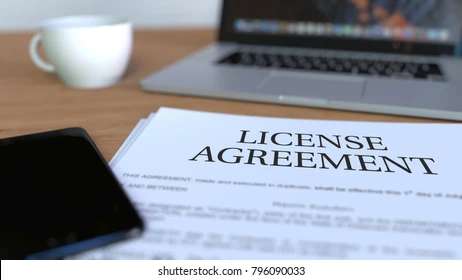The term “License” is defined under Section 52 of the Indian Easement Act, 1882 as “Where one person grants to another, or to a definite number of other persons, a right to do, or continue to do, in or upon the immovable property of the grantor, something which would, in the absence of such right, be unlawful and such right does not amount to an easement or an interest in the property, the right is called a license.”
A licencing agreement is, therefore, a written contract that outlines the terms and conditions under which one party (the licensor) grants the other (the licensee) permission to use its property, intellectual property, brand name, trademark, or patent technology.
Checklist items for a licensing agreement
-The name of the parties, their residential or registered office address and the act under which they are registered (in case parties are the companies) is mentioned.
-Tenure of the agreement is mentioned clearly.
-Whether the licensor owns the licensed property or not? And if he isn’t the owner but a license holder of the licensed property, does he have the right to further sublicense it?
-The licensed property is described accurately and exhaustively.
-All the terms that are intended to have a special meaning are defined and are used throughout the agreement, in the form in which they are defined.
-Mode of payment of licensed fee is mentioned.
-The formula for calculating licensed fee is correct.
-Provisions for indemnification are exhaustive to make good the loss suffered by the licensor.
-The definition of Force Majeure event is broad and exhaustive.
-The agreement is serving the intended purpose for which it is drafted.
-Provisions of this agreement are not violating any of the laws governing the agreement.
-The agreement has provisions to deal with any future changes in the laws governing this agreement.
Elements of a standard licensing agreement
Recitals– These are the group of clauses which usually starts with “whereas” and are placed before the main text of the agreement. They provide a general idea about the agreement such as who are the parties and the purpose of execution of the agreement.
Name of Parties– It includes the name and the place of residence of the parties. In case of a company, it also includes the act under which the company is registered.
Tenure– It specifies the term for which the license is granted by the licensor to the licensee. Sometimes, it also includes the procedure to extend or terminate the agreement.
Scope of Usage– It specifies the extent to which the licensee can use the license. It lays down the restrictions on the use of licensed property, which generally include the restrictions on geographical use, channel of trade, making modifications in the licensed property etc.
Licensed Fee– It is the amount of fee charged by the licensor for allowing the licensee to use or exploit the licensed property. It also includes the payment scheme and mode of payment of licensed fee.
Force Majeure– It is an unforeseeable and uncontrollable situation that prevents the parties from fulfilling their obligations under the agreement. Thus, this clause lays down the definition of force majeure event and its effect on the liabilities and obligations of the parties under the agreement.
Indemnification– This clause imposes a duty on the licensee to make good the loss suffered by the licensor, due to the acts of the licensee, during the tenure of the agreement.
Accounting, reports and audits– It lays down certain reporting and record-keeping procedures which the licensee has to follow to ensure proper records are maintained for a periodic royalty payment.
Governing laws and dispute resolution– It specifies the laws which governs the licensing agreement and lays down the provisions for resolving the disputes (relating to the agreement) that may arise between the parties during the tenure of the agreement.
How can a person create a license agreement?
-The ideal approach to design the licence agreement is to hire an advocate. However, as there is no legal requirement that advocates be the only ones who design licencing agreements, individuals or groups are free to draft their own agreements if they so like. Nonetheless, the following considerations should be made while creating your own licencing agreement:
-The language used in the agreement should be simple and clear.
-Avoid using short forms.
-The agreement should be as exhaustive as possible covering all the possible circumstances, relating to the licensed property, that may arise in future.
-To avoid confusion, make sure that the language or words used in agreement convey only one meaning to the readers.
-Date of execution, date of expiry, amount of licensed fee and other charges should be mentioned accurately and clearly.

